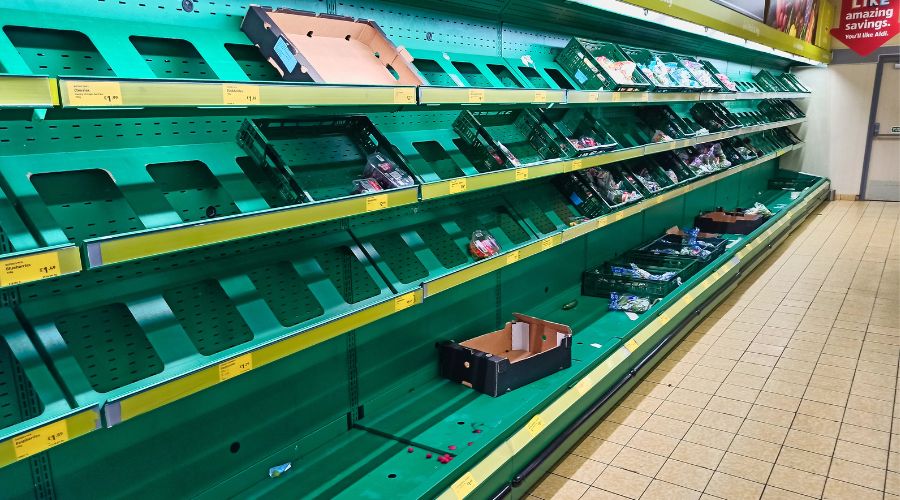Food insecurity on the rise, Defra report finds
12th December 2024
The UK Food Security Report has found Brexit, food inflation, climate change and global instability are key threats to food security.

There was a ‘notable decrease’ in the number of food secure households in 2023, according to the government’s UK Food Security Report, released on 11th December.
The proportion of food secure households declined from 92% in the financial year ending 2020, to 90% in 2023.
Lower income households and those with children or people with disabilities were most acutely affected, authors said.
The release of the report coincided with tractor rallies in London and elsewhere in the UK on the 11th, protesting against changes to inheritance tax, which critics say could wipe out family farms.
A closer look at food security
Vulnerable groups are the most affected by food insecurity, with 84% of households with disabled people classified as food secure, compared to 94% of households without disabled people.
Additionally, the poorest households consumed 42% fewer fruits and vegetables than recommended, compared to 13% for the richest.
The areas of England with the lowest rates of food security are the north west (87%) followed by the north-east, Yorkshire and the Humber and the West Midlands, all at 88%.
This is compared to the east, south-east and south-west of England which have the highest level of food security at 92%.
Meanwhile, in Scotland, 89% of households are food secure, and 91% in Northern Ireland.
Extreme weather
Extreme weather conditions are becoming more likely due to climate change – and continue to have a significant impact on domestic production, particularly arable crops, fruit and vegetables.
The published first estimate of the 2024 English cereal and oilseed harvest shows a 22% decrease (around 2.8mt) in harvested wheat from 2023.
However, according to the report, domestic production of fresh fruit increased slightly from 15% of total UK supply in 2021 to 16% in 2023.
READ MORE: ‘Food security is national security’- Farmers protest in London
READ MORE: GALLERY: Over 50 tractors attend ‘go-slow’ protest in Suffolk
The UK experienced one of its hottest and driest summers in 2022 and in England it was the wettest 18-month period on record between September 2022 to February 2024.
Authors said rising temperatures can offer opportunities for growing new crops – shown in the expansion of vineyards in the UK, for example – and a longer growing season.
However, rising temperatures will increase the variability of weather, and the likelihood of extreme weather events, which is a significant overall risk to UK food security.
Rising costs
Global events such as Russia’s invasion of Ukraine have had significant impacts on global and UK food security, causing a spike in input costs such as energy and fertilisers.
The report said: ‘While the impacts were global, it showed the UK’s and the rest of Europe’s vulnerability to food inflation from high energy prices and the effect of other cost pressures in the system.
‘UK food inflation was among the highest of the G7 countries in 2023.’
Fertiliser costs for UK farms rose from £1.5 billion in 2021 to £2 billion in 2022, before dropping to £1.4 billion in 2023.
Similarly, electricity prices doubled and gas prices nearly tripled.
READ MORE: Defra gives an update on Higher Tier
As a result of rising costs, food inflation has spiked to 45-year highs in 2022 and 2023.
Inflation for food and non-alcoholic beverages peaked in March 2023 at 19.2% while overall inflation peaked in October 2022 at 9.6%
Brexit also resulted in a sharp decline in imports from the EU in 2021, though this has increased slightly since.
Meanwhile, reliance on regionally concentrated suppliers of supply chain inputs is making the UK vulnerable to supplier failure – for example sunflower oil from Ukraine and calcium carbonate from France, the report authors warn.
Dependence on imports
The report confirmed that the UK produces around 60% of the food it consumes.
However, the country continues to be highly dependent on imports of fruit, vegetables and seafood. Many of the countries the UK imports these foods from are subject to their own climate-related challenges.
Additionally, the report found the long-term decline in the UK’s natural capital is a pressing risk to UK food production.
The report says: ‘The impacts of climate change, biodiversity loss and water insecurity both at home and abroad remain pressing risks to food security.
‘They drive volatility in the present and put sustainability and resilience of food production at risk over the longer term.
‘These risks are also now interacting with heightened geopolitical tensions.
‘Labour shortages in key sectors at home are also a continuing stress factor affecting domestic food production.’
Read more food and drink news.
